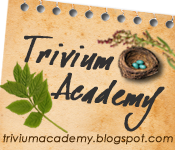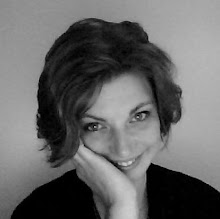I wrote this at the WTM Boards and I wanted to put it here to be a part of our digital scrapbook, a fellow homeschooler asked what I meant by literary science.
Literary science is what I'm calling the approach we're about to take with science, reading books that ignite the spark to explore more or just illuminate science in a different but deeper way than textbooks and modern day surface-level books can.
For example, from Our Humble Helpers by Jean Henri Fabre:
Quote:
| "These curious particulars of the hen's habits," said Jules, "are quiet familiar to us all; we see them everyday with our own eyes. One only is new to me: hens, you say, swallow little grains of sand which takes the place of teeth for grinding the food in the gizzard. I don't know what the gizzard is and I don't see how little stones that have been swallowed can be used as teeth." "A short digression on the digestive organs of birds," replied Uncle Paul, "will give you the information you ask for." |
Then there's the Thornton Burgess books, take any one of them and you can make a mini-study of it. From The Adventures of Chatterer the Red Squirrel, the reader realizes that Shadow the Weasel and Redtail the Hawk are deadly enemies of Chatterer and the reader learns about the habits and life of the animals that surround the Red Squirrel in story form. It is sort of sneaky, here's this animal story and you're learning something.
Just today dd7 read half of the first chapter of Mother West Wind's Children and she was narrating with excitement, wanting to tell me the story that she read because she enjoyed it so much but I know she also read about a skunk looking for beetles, rats have long, smooth, tapering tails and that Happy Jack Squirrel stores his nuts in a hole in a chestnut tree. Not to mention it's much better reading material than the series on the local bookstore shelf.
Or this excerpt from Seed-Babies by Margaret Morley

We're going to read about science and then dig as deep as we want from there and the part that melts my heart is the books that were written for children in 1850-1920 during the heyday of Natural Science, when it was the "thing" to talk a nature walk and observe a mosquito or to talk about the numerous experiments you're working on during a formal dinner.
Plus there are fabulous authors that write with passion in books we miss because we're looking to get science "done". I wouldn't have seen a Jim Arnosky book or even cared about reading about John Muir before, just whatever curriculum we were using and what books they recommended. Now I'm surrounded by books I can't wait to read with my children not because I want my children to learn from them (that will come naturally) but because I want to share the joy of reading these books with them. I want to explore too!
I'm working on a K-8 outline of science studies and then I'll fill with books I don't want to miss. I want it to flow with the seasons but also allow us to study what interests us and ensure we cover certain topics before 9th grade. I just read today in "The Educated Child" by William Bennett that a child's interest in science is dependent on the years prior to 3rd grade, that around 9-10 years of age if the spark for science hasn't been ignited, it probably never will be. I don't want this, science is God's expression and artistry- I feel it's such a crucial part of an individual's personality and character to look outside of themselves and see the wondrous world around them. I think power of curiosity and observation as well learning about God's creation are a few of the many beautiful gifts God has given us.
Okay, I'm rambling. Anyways, the short answer- read inspiring, informative literary books about science: books like above, biographies and passionate authors and go from there. Do experiments to see what the scientist saw, learn how to classify and observe.
This is my pet subject and I'm thrilled to be able to do this with my kids. I'm thrilled to be able to have the time to wonder with them and notice things. As parents, we are SO blessed.




























7 comments:
Jessica,
I am a huge fan of John Muir and enjoy all his writings. I've walked his paths and seen his sights and nothing thrills me more than to hear of someone else who is excited to read about his work.
Sidenote: John Muir and Ralph Waldo Emerson were contemporaries and they actually admired each other. They influenced each other's thinking and that is huge. When your daughter gets older, you might try putting those two elements together....John Muir's conservation writings and Emerson's poetry and essays. Connections always thrill me.
Any time you want to talk Muir or Rachel Carson or anyone else like that, feel free to think of me. :)Hey, why don't you just come to CA and I will give you the John Muir Grand Tour???
Barb-Harmony Art Mom
Jessica- I love the changes you are making to your science program. Are you going to post your list of literary science books?
Thanks again for inspiring me more! Laura
Jessica, any good suggestions for a literary approach to astronomy, geology and meteorology? These are the subjects we'll be learning next year. I love Seed Babies and Old Mother West Wind, but can't find anything like that for studying earth and space science topics.
Looking back on your Grammar Life Science plans. Do you regret doing them that way? Do you wish you had done this instead? We're starting Living Learning Books for first and it's comparable to what you did. Just wanted to get an insight on someone who's been there. BTW: we love nature study! I've been doing it with my kids since they were born! I still have pictures of them drooling over leaves and "studying" the bark of a tree. It's wonderful that you're taking steps to head in that direction!!
Liz
Rose,
Give me a little more time and I'll post with titles for everything I've found but right off the top of my head:
Astronomy:
- To Space and Back by Sally Ride
- Nicolaus Copernicus, Earth is a Planet
- Starry Messenger: Galileo Galilei by Peter Sis
Read books that give first-hand accounts or biographies of the people in science that made a difference. You can then take a tour of the solar system with a non-fiction book that teaches about each planet.
At Yesterday's Classics, check out
Madam How and Lady Why (available free online too)
by Charles Kingsley
Introduces children to geology through conversations about earthquakes, volcanoes, coral reefs, and so on. Encourages children to wonder about the distinctive features of the landscape about them and how they came to be that way. Ages 10-14.
The Fairy-Land of Science
by Arabella Buckley
Introduction to the wonders of the physical world: sunbeams and the work they do, the aerial ocean in which we live, a drop of water on its travels, the two great sculptors—water and ice, the voices of nature and how we hear them, the life of a primrose, the history of a piece of coal, bees in the hive, and bees and flowers. Ages 10-13
The Story Book of Science
by Jean Henri Fabre
The wonders of plant and animal life told with rare literary charm by Uncle Paul in conversations with three children. Besides such stories as the ants' subterranean city, the spider's suspension bridge, and the caterpillars' processing, he unlocks the mystery behind thunder and lightning, clouds and rain, the year and its seasons, and volcanoes and earthquakes. Ages 9-12
Once you get yourself exposed to a certain caliber of books, it's hard to go back and you'll be able to discern whether a title is "living" enough to captivate your children. If you're bored reading the book, your kids will be too.
Go to my profile, my wishlist of living science books is linked there- you can see some of the books I've chosen.
If you want to study meteorology- read a biography about a meteorologist, Christian Light Publications (also at RainbowResource.com with an inside view) has a book called "My Calendar Book" which is perfect for a year of weather charting and it's cheap.
I've got TONS of ideas, I'm working at putting them down on paper.
:) Jessica
Liz,
My science plans were made to fulfill a certain idea of science studies, the unimaginative (to a certain extent), curricula-driven idea. Even though they are perfectly fine, they are not as efficient at developing a love of science, wonder and curiosity in a child like what we're transitioning to.
My thinking has shifted from schoolish, curricula-driven science to developing my children's character and hearts through science. We don't want to get science "done" with an official stamp and check of a box, I want thinking, questioning and researching kids with a curiosity that won't stop.
I feel like our studies were fruitful but they could have been even better so while I have a little regret, ultimately I'm glad that we did our lessons instead of depending on a curriculum. In the revamp we will be studying life and earth science again with a different approach, and I'm grateful to have realized this now in 2nd grade than in 5th or 8th grade and felt like we missed out on something spectacular.
The "spectacular" comes from me- the books we choose to read, the way I share wonderment and curiosity with my kids, my involvement. This type of approach isn't for everyone, it isn't for those who just want to get science done, it's for individuals that want to be kids again with their own kids and want to explore the world around them. In a way, we quit "homeschooling" and we're living. Marcia Somerville's story about how she told her husband at the door that she wasn't going to homeschool anymore has really been on my mind.
http://www.squidoo.com/marciasomerville
I learned of her story through the "Teaching with Tapestry" seminar. But the words, "she came up with a different way to teach" is exactly what we're doing with our science studies.
:) Jessica
I've heard the term "literary science fiction" but love your concept!!!
Although, I must say, Chemistry is one of these coolest things to study -- very curiosity arousing, very much an expression of God's artistry!!!
The comments already posted here are very informative too...great discussion!
Lee
Post a Comment